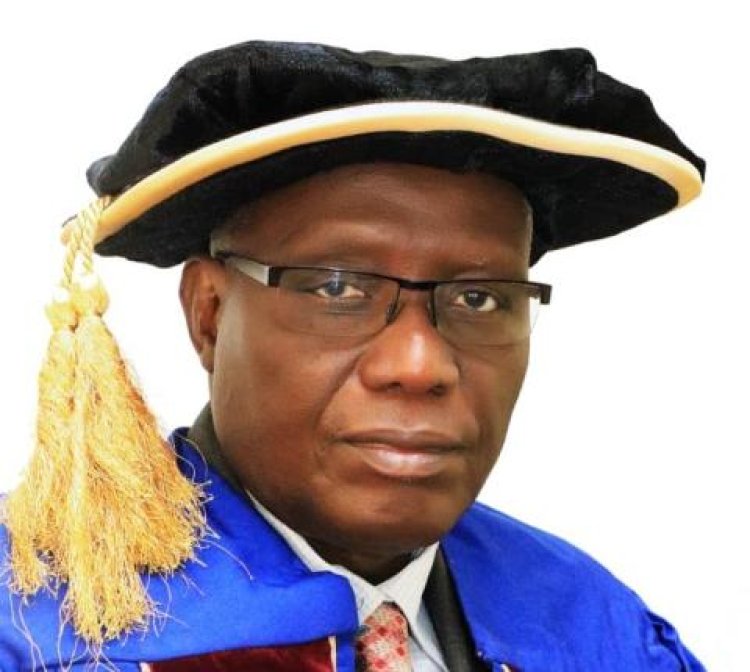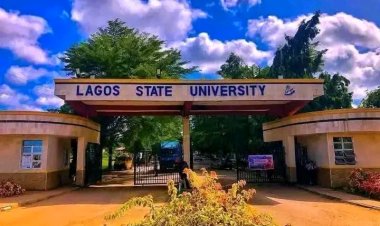Building digital ecosystem, elixir to ‘Japa’ for Nigerian students – NOUN VC, Prof. Peters
National Open University of Nigeria (NOUN) Vice Chancellor, Prof Olufemi Peters has said that Building digital ecosystem is the elixir to ‘Japa’ for Nigerian students

The Vice-Chancellor, the National Open University of Nigeria (NOUN), Prof. Olufemi Peters has urged the University of South Africa (UNISA) to take the lead as “infant” institutions in Open and Distance Learning continue to spring up across the continent, Myschoolnews report, Myschoolnews report.
The Vice-Chancellor stated this in a keynote address recently in Johannesburg, South Africa during the Gala Dinner to mark UNISA’s 150-year anniversary.
Open Learning
The don was invited to the University of South Africa’s 2023 MoodleMoot Africa Conference in August as one of the key events in the celebration of the university’s 150-year anniversary.
Citing the United States of America, the People’s Republic of China and the Russian Federation as examples, he urged UNISA to exert its influence across Africa, expanding access to education through its profound depth, capacity, and capability.
“This brings me to the contemporary issue of academic programme offerings – a consequence of the post COVID-19 pandemic era. One of the greatest attributes of ODL is the flexibility it offers within a specific context. Flexibility encompasses programme offerings, delivery processes and mechanisms and programme duration. What remains is the flexibility in the programme or course structure that we can provide.”
Peters added that though there is no global consensus on the term ‘micro-credential’, he aligns with Oliver’s (2019) definition that characterises micro-credentials as “digital certification of assessed knowledge, skills and competencies in a specific area or field”, saying these can be a component of an accredited programme or stand-alone courses supporting the professional, technical, academic and personal development of the learners.
Micro-credentialing, a global trend in education
“Notably, micro-credentials are reshaping higher education, with institutions acknowledging their potential as new learning pathways, a trend especially visible in countries like England, USA, Canada, and Australia. In Africa, South Africa has been singled out as the most active country on the continent and one of the most active in the entire world (World Economic Forum, 2017).”
At a separate forum, Peters opined that the University of South Africa (UNISA) and the National Open University of Nigeria (NOUN) share several commonalities, with both being renowned for their emphasis on open and distance learning, providing education to a wide range of students and using technology to reach learners.
He stated that UNISA has matured to become one of the world’s largest distance learning institutions, with about 360,000 active students in over 130 countries.
“By their fruits, you shall know them (Matt.7:15). The products of UNISA are now well established. They occupy prominent socio-economic positions in many sectors of the Southern and Eastern Africa landscape”, he said.
Like UNISA, like NOUN
The NOUN VC added, “One of the philosophical attributes that captured my attention about the Vice-Chancellor of UNISA is her passion for pan-Africanism. This concept involves the pursuit of a shared experience of intellectual exploration, entrepreneurial endeavours, commercialisation, technological innovation and practice both within the global south.”
He revealed that in Asia, the Malaysian Qualifications Agency (2020) underscores micro-credentials as tools for lifelong learning-re-skilling and up-skilling- aligned with industry and societal needs, often surpassing traditional degrees in dynamism, competitiveness, demand responsiveness, brevity, and cost efficiency. Further benefits include access, stackability and recognition of non-formal learning.
“For distance learning institutions, micro-credentials serve as a channel to boost enrolment; offer an avenue for additional revenue generation and enable institutions align evolving needs of learners in a rapidly changing knowledge and skills landscape”.
“Micro-credentials possess the potential to address skills gaps in both current and future labour markets. They empower learners to specialise in specific skill areas or topics, especially in an era where artificial intelligence, automation, and connectivity are redefining industries and innovative pedagogies are becoming increasingly important. We must ask ourselves, how can we foster critical thinking, creativity, and problem-solving skills? How can we ensure active contribution to our societies rather than passive information consumption?”
While mainstreaming this concept in conventional thematic degree-awarding university systems will face some challenges including policy and regulatory hurdles associated with micro-credentials, the onus falls upon institutions like UNISA to champion this cause, according to Peters.
“Indeed, NOUN is also one of the largest Moodle users in Africa, boasting over 150,000 active students. It also has over 2,100 courses that are accessed by students via the NOUN Moodle platform. Our institution also uses locally installed Moodle instances for assessment in over 100 study centres across Nigeria.
“MoodleMoot should be more than just a conference; it should epitomise a convergence of minds, a nexus of ideas and a platform where educators, technologists and visionaries unite to share insights, best practices, and aspirations. As we come together under the banner of Moodle, we stand on the precipice of transforming education, harnessing the power of digital platforms to redefine how knowledge is acquired, shared, and utilised.
A learning ecosystem
“Imagine an e-learning ecosystem designed by Africans for Africans. An ecosystem that leverages technology to overcome the challenges of geographical barriers, connectivity, and resource limitations; an ecosystem that empowers educators to craft locally relevant content that resonates with the diverse cultures and languages that define Africa. As we strive for a sustainable e-learning ecosystem, let us recognise that innovative pedagogies hold the key to unlocking our students’ potential.
“Tailoring education to the African context means integrating our rich cultural heritage, languages, and traditions into the curriculum. It means encouraging collaborative learning, fostering a spirit of entrepreneurship, and nurturing the skills that will define our success in the era of the Fourth Industrial Revolution and beyond.
“Building a digital ecosystem in Africa using Moodle presents exciting opportunities to transform education across the continent. Permit me to highlight a few ideas which I believe may also have been echoed throughout the conference.”
“Building a digital ecosystem in Africa requires a collaborative effort that aligns with the unique challenges and opportunities of the continent. By leveraging Moodle’s versatile features and engaging with local stakeholders, a transformative educational landscape can be cultivated for the benefit of African learners.
“Let us harness the flexibility of the Moodle platform, together with the skill and expertise present in the ICT directorates and our computer science departments at our various universities, to shape the future of education, foster innovation, and redefine the way knowledge is imparted and acquired amongst us .
Personalised learning
Peters further posited, “How about having peer-to-peer learning Initiatives, learning analytics and personalized learning, and implementing multilingual capabilities to accommodate the diversity of languages spoken across Africa, ensuring that language is not a barrier to accessing quality education?
“Flexibility encompasses programme offerings; delivery processes and mechanisms; and programme duration. What remains is the flexibility in the programme or course structure”, he said.





